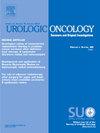早期职业泌尿科医生的泌尿肿瘤病例量:2003 年至 2019 年美国泌尿外科委员会认证数据分析。
IF 2.3
3区 医学
Q3 ONCOLOGY
Urologic Oncology-seminars and Original Investigations
Pub Date : 2025-05-01
DOI:10.1016/j.urolonc.2024.09.034
引用次数: 0
摘要
导言:随着美国人口的老龄化,泌尿科癌症的发病率预计会增加,但泌尿科医生队伍的规模预计不会以相应的速度增长。为了了解这种日益严重的不平衡现象,我们探讨了 2003 年至 2019 年间,早期职业泌尿科医生在多大程度上开展了肿瘤病例,尤其是开放性手术病例:我们研究了 2003 年至 2019 年间申请美国泌尿外科医师资格认证口试(第二部分)的早期职业泌尿科医师提交的病例日志。我们纳入了第一条记录和最后一条记录之间至少间隔 120 天的病例记录。我们使用 CPT® 代码来识别实施开放式根治性膀胱切除术、肾切除术或前列腺切除术的泌尿科医生,以及实施微创 (MIS) 根治性肾切除术或前列腺切除术的泌尿科医生。我们计算了实施每种手术的泌尿科医生的年度比例。多变量逻辑回归分析分析了实施每种手术与肿瘤学专业或研究员培训之间的关联,并对性别、执业类型和病例日志提交年份进行了调整:我们确定了 2003 年至 2019 年期间提交病例记录的 4166 名泌尿科医生。他们的平均年龄为 34.9 岁,81.3% 为男性,14.2% 专攻肿瘤学,8.2% 接受过肿瘤学研究培训。从 2003 年到 2019 年,实施开放式肿瘤手术的泌尿科医生比例有所下降,而实施 MIS 肿瘤手术的比例有所上升。肿瘤学研究员培训显著增加了实施以下手术的几率:开放式根治性膀胱切除术(接受过研究员培训的 72.5% 对未接受过研究员培训的 30.0%,OR 2.51,95% CI 0.63-0.92,P <0.001)、开放式根治性肾切除术(接受过研究员培训的 74.3% 对未接受过研究员培训的 42.4%,OR 2.02,95% CI 1.48-2.78,P <0.001)、开放根治性前列腺切除术(接受过研究员培训的为 42.1%,未接受过研究员培训的为 26.9%,OR 1.86,95% CI 1.34-2.58,P <0.001)和 MIS 根治性前列腺切除术(接受过研究员培训的为 80.4%,未接受过研究员培训的为 45.0%,OR 1.69,95% CI 1.16-2.48,P =0.006)。如果将只接受过肿瘤学专业培训的人员与同时接受过肿瘤学专业培训和研究员培训的人员进行比较,我们发现接受过肿瘤学研究员培训的人员实施开放性根治性膀胱切除术(OR 2.58,CI 1.78-3.74,P<0.001)、开放性根治性肾切除术(OR 2.06,CI 1.42-2.99,P<0.001)和开放性根治性前列腺切除术(OR 2.12,CI 1.44-3.12,P<0.001)的几率要高出 2 倍以上。女性泌尿科医生实施每种肿瘤手术的几率都明显较低:在这项对早期职业泌尿科医生病例日志的分析中,2003年至2019年间,泌尿科医生实施根治性膀胱切除术、根治性肾切除术和开放性前列腺切除术的比例有所下降。然而,肿瘤学专业或研究员培训显著增加了实施这些手术的几率。具体而言,仅肿瘤学研究员资格就使实施主要开放式肿瘤手术的几率增加了 2 倍多。这些发现反映了早期职业泌尿科医生的不断专业化,因此肿瘤学研究员或实践重点很可能已成为获得开放式泌尿科手术和成为高产量泌尿科肿瘤外科医生的必要条件。本文章由计算机程序翻译,如有差异,请以英文原文为准。
Urologic oncology case volume among early career urologists: An analysis of certification data from the American board of urology between 2003 and 2019
Introduction
The incidence of urologic cancer is expected to increase as the U.S. population ages, but the size of the urologic workforce is not expected to increase at a commensurate rate. To understand this growing imbalance, we explored the extent to which early career urologists performed oncology cases, particularly open surgical cases, between 2003 and 2019.
Materials and Methods
We examined case logs submitted by early career urologists applying for their oral American Board of Urology Certifying Examination (Part 2) between 2003 and 2019. We included case logs spanning at least 120 days between the first and last record. We used CPT® codes to identify urologists who performed an open radical cystectomy, nephrectomy, or prostatectomy, as well as those who performed a minimally invasive (MIS) radical nephrectomy or prostatectomy. We calculated the annual percentage of urologists who performed each procedure. Multivariable logistic regression analysis analyzed the association between performing each procedure and specialization or fellowship training in oncology, adjusting for gender, practice type, and year of case log submission.
Results
We identified 4,166 unique urologists submitting case logs between 2003 and 2019. Their average age was 34.9 years, 81.3% were male, 14.2% specialized in oncology, and 8.2% reported oncology fellowship training. From 2003 to 2019, the percentage of urologists who performed open oncologic procedures decreased, while the percentage who performed MIS oncologic procedures increased. Fellowship training in oncology significantly increased the odds of performing the following procedures: open radical cystectomy (72.5% with fellowship training vs. 30.0% without fellowship training, OR 2.51, 95% CI 0.63–0.92, P < 0.001), open radical nephrectomy (74.3% with fellowship training vs 42.4% without fellowship training, OR 2.02, 95% CI 1.48–2.78, P < 0.001), open radical prostatectomy (42.1% with fellowship training vs. 26.9% without fellowship training, OR 1.86, 95% CI 1.34–2.58, P < 0.001) and MIS radical prostatectomy (80.4% with fellowship training vs. 45.0% without fellowship training, OR 1.69, 95% CI 1.16–2.48, P = 0.006). When comparing those with solely oncology specialization to those with both oncology specialization and fellowship training, we found that those with oncology fellowship training had over 2 times higher odds of performing open radical cystectomy (OR 2.58, CI 1.78–3.74, P < 0.001), open radical nephrectomy (OR 2.06, CI 1.42–2.99, P < 0.001) and open radical prostatectomy (OR 2.12, CI 1.44–3.12, P < 0.001). Female urologists had significantly lower odds of performing each oncologic procedure.
Conclusions
In this analysis of early career urologist case logs, the proportion of urologists performing a radical cystectomy, radical nephrectomy, and open prostatectomy declined between 2003 and 2019. Oncology specialization or fellowship training, however, significantly increased the odds of performing the procedures. Specifically, oncology fellowship alone was associated with over 2 times the odds of performing major open oncologic procedures. These findings reflect ongoing specialization among early career urologists, such that an oncology fellowship or practice focus has likely become necessary for access to open urologic procedures and to become a high-volume urologic oncology surgeon.
求助全文
通过发布文献求助,成功后即可免费获取论文全文。
去求助
来源期刊
CiteScore
4.80
自引率
3.70%
发文量
297
审稿时长
7.6 weeks
期刊介绍:
Urologic Oncology: Seminars and Original Investigations is the official journal of the Society of Urologic Oncology. The journal publishes practical, timely, and relevant clinical and basic science research articles which address any aspect of urologic oncology. Each issue comprises original research, news and topics, survey articles providing short commentaries on other important articles in the urologic oncology literature, and reviews including an in-depth Seminar examining a specific clinical dilemma. The journal periodically publishes supplement issues devoted to areas of current interest to the urologic oncology community. Articles published are of interest to researchers and the clinicians involved in the practice of urologic oncology including urologists, oncologists, and radiologists.

 求助内容:
求助内容: 应助结果提醒方式:
应助结果提醒方式:


